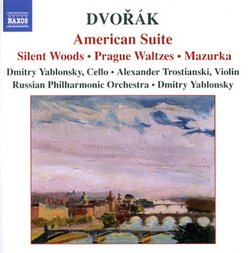| All Artists: Antonin Dvorak, Dmitry Yablonsky, Russian Philharmonic Orchestra Title: Dvorák: American Suite; Silent Woods; Prague Waltzes; Mazurka Members Wishing: 0 Total Copies: 0 Label: Naxos Release Date: 1/18/2005 Genre: Classical Styles: Ballets & Dances, Polkas, Forms & Genres, Concertos, Symphonies, Instruments, Strings, Symphonies Number of Discs: 1 SwapaCD Credits: 1 UPC: 747313235223 |
Search - Antonin Dvorak, Dmitry Yablonsky, Russian Philharmonic Orchestra :: Dvorák: American Suite; Silent Woods; Prague Waltzes; Mazurka
 | Antonin Dvorak, Dmitry Yablonsky, Russian Philharmonic Orchestra Dvorák: American Suite; Silent Woods; Prague Waltzes; Mazurka Genre: Classical
|
Larger Image |
CD DetailsSimilar CDs
|
CD ReviewsA Great Mix of Dvorak Favorites and Rarities Timothy Kearney | Hull, MA United States | 01/26/2005 (5 out of 5 stars) "One of the reasons I love the music of Dvorak is that it is both predictable and varied. In all of his music, his distinct Czech national sound, as well as his flair for orchestration is easy to detect. Yet he is able to write some of the most creative pieces ever composed. The Naxos label has released a great catalogue of Dvorak's work. Most of the releases have some of his well known pieces as well as some of his lesser known works and this new release AMERICAN SUITE follows suite. The best known works of the compilation include "American Suite," "The Polonaise in F Flat Major" and "Five Prague Waltzes." While all of the pieces are played beautifully by Russian Philharmonic Orchestra under the direction Dmitry Yablonsky, I found the works for soloist and orchestra most enjoyable. The "Mazurka for Violin and Orchestra" which opens the CD is a work that I am surprised is not a familiar concert showpiece and the same can be said for cello pieces "Rondo" and "Silent Woods." Once again, Naxos has released a wonderful compilation at a reasonable price with excellent liner notes. " Some Dvorák Rarities and Old Friends, Nicely Played J Scott Morrison | Middlebury VT, USA | 02/20/2005 (4 out of 5 stars) "Although I have a number of CDs conducted by Dmitry Yablonsky, and though I knew he was a cellist, I don't recall hearing him play that instrument. On the basis of this CD I'd have to say that he is one of the better cellists around these days (Side note: in an upcoming review, I'll have more raves about the marvelous German cellist Maria Kliegel, whose Bach Solo Suites has lately been causing some compulsive listening on my part.) He gets a chance here to play and conduct two Dvorák cello and orchestra pieces: the semi-familiar 'Silent Woods' and the less-well-known 'Rondo.' 'Silent Woods' ('Klid' in Czech, sometimes known as 'Waldesruhe' in German) is occasionally heard in concert. It is a contemplative pastorale originally part of a solo piano suite. It sounds as if it couldn't have been composed for anything other than cello and orchestra; it's hard to imagine a pianist being able to maintain the slowly moving legato melodic line with anything comparable to the cello's ability to sing it ecstatically. Yablonsky's cello sings like a great baritone. His performance of 'Rondo,' a six-minute minor-key work is equally well-played but the piece itself is relatively trivial, if pretty enough. The glory of this set is the first track, a six-minute wonder, 'Mazurka for Violin and Orchestra,' Op. 49 (B90), played full-out in Oistrakhian fashion by a violinist I am only vaguely familiar with, Alexander Trostianski. Both the piece and the performance are barnburners, full of exciting rhythms, virtuosic double-stops and other violinistic sparkle. This is not deep music, but it assuredly is exciting. Too bad violinists don't ordinarily play encores in orchestral concerts after they've played the obligatory concerto. This would send the crowd out dancing. Superb! The 'American' Suite is beautiful and reasonably well-known, and has had a number of fine recordings, among them those by Neumann, Dorati and Tilson Thomas, as well as older ones by Ancerl and Talich. It is given a competitive performance with delicacy and point by Yablonsky and his increasingly impressive Russian Philharmonic. The rest of the disk comprises works that are not from Dvorák's top drawer. 'Seven Interludes' for small orchestra, although with some fine moments, seem pretty slight to me, although the third movement, 'Con molta espressione,' a slow 3/4 meditation, is extraordinarily lovely and played rapturously here. The 'Five Prague Waltzes' are a cut above the Interludes as music per se, and the performance is exhilarating. One wants to get up and dance around the room. But, that said, I slightly prefer a recording by the Hungarian conductor Iván Fischer and the Budapest Festival Orchestra. 'Polonaise in E Flat Minor,' 'Nocturne in B Major' and 'Polka in B Flat Minor'--the latter an old friend that I fondly remember being played in a wind band arrangement in my own hometown with its large Bohemian population-- are all given fine performances here. This would, I think, be a perfect budget recommendation for someone who wants to slightly broaden their knowledge of Dvorák's always tuneful and accessible orchestral music. TT=78:42 Scott Morrison" Good performances of enjoyable Dvorak rarities G.D. | Norway | 05/21/2009 (4 out of 5 stars) "Naxos's survey of the complete orchestral works of Antonin Dvorak is now coming to a close with this generally well-played disc of miscellania and curiosities. There is nothing here even remotely on the level of the symphonic poems, say, but the music is generally pleasing and well-written, and some of it even quite memorable.
The disc starts out with a Mazurka arranged for violin and orchestra from a violin and piano piece, and it is an exciting, colorful little gem, with the solo part well handled by Alexander Trostianski. In the following, equally charming rondo, the conductor Dmitry Yablonsky himself plays the solo part and does a more than satisfactory job of it. The very early seven interludes for small orchestra (I don't know if they have even been previously recorded?) are not very characteristic works; they are pleasing enough to deserve a listen, but there is nothing particularly interesting or memorable about them; when Yablonsky and the Russian Philharmonic Orchestra fail to conjure up very much in terms of atmosphere here, it really isn't their fault. In Silent Woods - presumably the most played work on the disc? - Yablonsky is back with the cello providing a characteristic, mellow sound and a finely rounded performance. The tuneful and memorable Polonaise and the delightfully charming Polka receive lilting, dancing performances, if a little slick, and the early Nocturne receives a very fast run-through, too fast by far to capture any of the evocative atmosphere. The Five Prague Waltzes are fun and well played (but no match for, say, Fischer's version). The American Suite is, however, the main work on the disc. In five movements, and originally for piano, it is not a very profound work, and probably not quite on the level of inspiration of the composer's earlier Czech suite. Yet it is very enjoyable and spirited, and the performances make it bounce along amiably. Overall and interesting program, then, and the performances are generally very fine if perhaps a little straightforward and lacking the last ounce of evocative atmosphere. The sound quality is a little raw but nothing to complain about; recommended." |

 Track Listings (19) - Disc #1
Track Listings (19) - Disc #1


